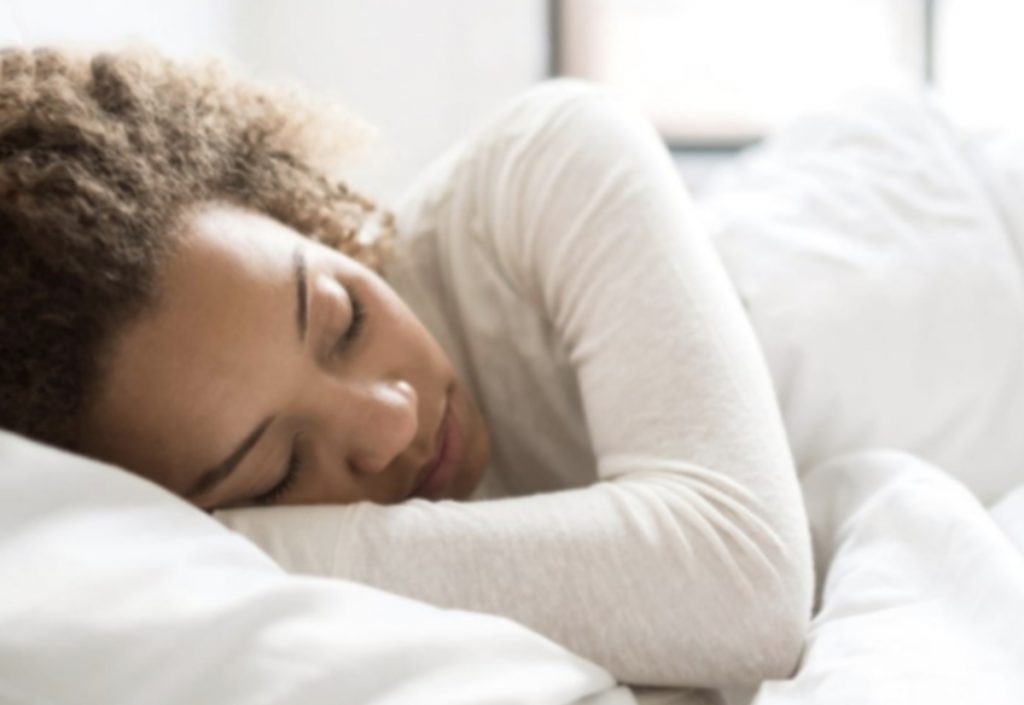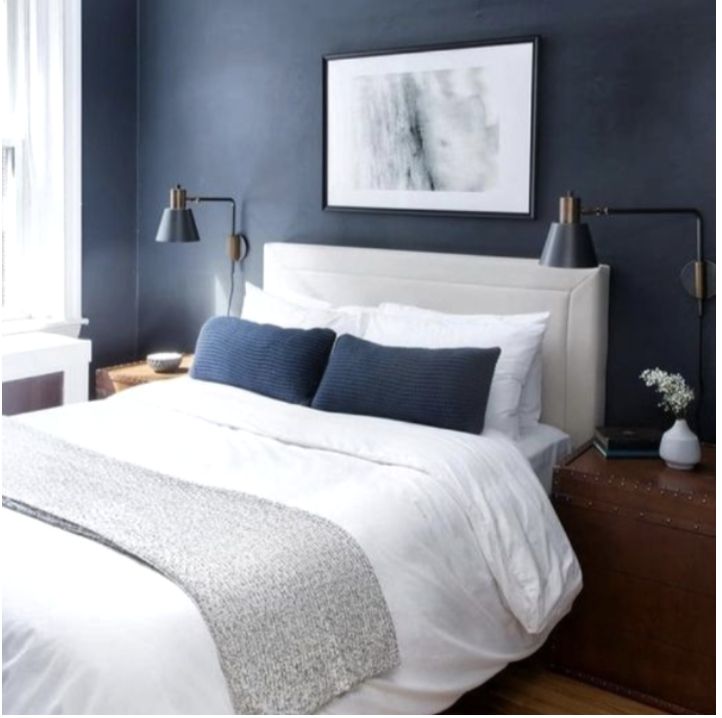Please Note: The Good Food Guide is committed to providing the most up-to-date information on wellbeing as it relates to the health benefits of natural foods. All posts are believed to be accurate according to the best discernment of the author and referenced material. They are posted as a source of information only. They are not intended to diagnose, treat, cure or prevent any disease. All health concerns or conditions should always be assessed by your health care professional.
A Better Night's Sleep

We spend a third of our lives asleep. That’s almost 25 years! You’ve probably heard eight hours is the golden rule. Turns out, it depends on your age. Newborns sleep 14 to 17 hours; toddlers should get 11 to 14 hours. Adults should clock in seven to nine hours. And those over 65 should get seven to eight hours. Yet, 60% of Canadian adults are sleep deprived, averaging only 6.9 hours of sleep a night. Thirty percent of adults get less than 6 hours a night which can negative affect behaviour and productivity.
Sadly, our kids are in the same predicament. According to the US Center for Disease Control and Prevention, more than 2 out of 3 high school-aged adolescents aren’t getting enough sleep and alarming a similar trend exists among middle school-aged children.
So what happens if you don’t get enough shut-eye? Theory has it that a good night’s sleep helps process and file information our brain has received during the day, while repairing and rebalancing the body both mentally and physically. In fact, sleep influences all of the body’s major physiological systems, including the immune system, our mental health, weight and overall quality of life. So in short, we require these long periods of sleep to restore and rejuvenate, grow muscle and repair tissue in order to maintain optimum health.
The penalties of sleep deprivation are incremental and only get worse until something changes. The occasional bad night may leave you irritable, but several can affect your concentration and mood. Further, accumulation over weeks and months, can lead to serious health complications such as high blood pressure, obesity and diabetes. So a good night’s sleep is much more than a little shut eye, it is vital for sustaining both physical and mental well being.
In short, your relationship with your pillow is one of the most important ones in your life. Prioritize it and your mind and body will thank you.
When Hitting The Pillow Practice Sleep Hygiene
A good night’s sleep is just as important as regular exercise and a healthy diet. Research indicates that poor sleep has immediate negative effects on your hormones, exercise performance, and brain function. It can also cause weight gain and increase disease risk in both adults and children.
In contrast, good night’s sleep can help you eat less, exercise better, and stay healthy.

If you want to optimize your health, getting a good night’s sleep is one of the most important things you can do. But sometimes counting sheep doesn’t cut it. So here’s some steps that can help you to practice sleep hygiene.
1. Optimize Bedroom Environment.
The way your bedroom is set up can be key factor to quality of sleep. Make sure your bedroom is a quiet, relaxing and clean. Bedroom temperature also has a profound affect on sleep quality. One study found bedroom temperature affected sleep quality more than external noise. Blackout curtains work wonders to block out light and leaving the window open just a crack, yes, even in winter will help keep your bedroom cool while you’re cosy under your warm blankets.


2. Increase Daylight Exposure
Natural sunlight or bright light during the day helps keep your circadian rhythm healthy.
This improves daytime energy as well as night time sleep quality and duration.
3. Reduce Blue Light Exposure
Due to its effect on your circadian rhythm, blue light exposure from electronics like smartphones and computers, trick your body into thinking it’s daytime. Stop watching TV or computer streaming two hours before heading to bed. And that goes for kids too. Be firm – solving the problem won’t be easy…impose a ‘media curfew’ for a certain period of time before bed.
While wearing glasses that block blue light can help while working, it’s much better to read a book or magazine in natural light just before turning in.
And, as we all know distance seems to make the double tap grow fonder. Keeping your phone in another room won’t work.

Instead, keep your device charging on your dresser or somewhere you can’t reach it, instead of on your bedside table.
Switch your settings to grayscale to make your phone less appealing because those screens, and yes that includes the TV, are like a traffic jam en route to the Land of Nod.

4. Cut the Caffeine, Alcohol & Chocolatey Treats
Consuming any form of caffeine late in the day, stimulates your nervous system hindering your body from naturally relaxing at night. Caffeine can stay elevated in your blood for 6-8 hours. Caffeine in chocolate products varies, but the more cocoa solids it contains, the higher the caffeine content.
Alcohol can increase symptoms of sleep apnea, snoring and disrupted sleep patterns while altering natural melatonin production.
5. When you’re all wound up…
Just breathe. In through the nose, out through the mouth. Breathing in through the nose helps slow the breath and fight infection, while breathing out through the mouth releases more carbon dioxide. All of which helps you sleep better.
When your head is full of too many things, take an oxygen break. Use the 4-7-8 breathing technique to clear your head and relax your mind.
Here’s how it works: Inhale through your nose for four seconds, hold for seven seconds, and breathe out through your mouth for eight seconds.

Or try a yoga breathing technique called Nadi Shodhana. It’s helps you focus. Plug your right nostril and inhale through your left. Then plug your left nostril and exhale through your right. And repeat.
6. Different folks — different techniques when hitting the pillow.
Try to be in the moment by practicing some mindfulness meditation. Focus on breathing to bring your attention to the present moment. When it’s bedtime, the past and the future need not apply.
If you are in need of a little medication guidance check out some apps like Headspace and Stop, Breathe & Think
For those of you who have dreams of sugar plums — make dinner, in your mind. Really.
Close your eyes and think of a dream meal you’d like to prepare. Envision going through all the steps necessary to get that meal ready. Nothing brings sweet dreams quite like mincing garlic in your head at midnight.
And for those who think history’s a snooze, read a long biography — there’s nothing like a book about a former president to get your eyelids into gear.

Lastly, for those who are soothed by a crossword puzzle, flip and reverse. AKA singing the alphabet backward.
Warning One: Do not freak out when you get stuck. Warning Two: You’ll soon realize you can get quite good at this, so it loses its power over time. The advanced version? Counting backward from one hundred.

7. Rule Out Sleep Disorder
If you are struggling with sleep, consult your healthcare provider. A common issue is sleep apnea which causes inconsistent and interrupted breathing. Other issues can include sleep movement disorders and circadian rhythm sleep/wake disorders which are common in shift workers.
8. Reduce Nap Time
Napping is certainly one of life’s little pleasures but long naps may impair sleep quality at night. Either shorten naps or stop napping in order to get a better night’s snooze .


9. Sleep and Wake at Consistent Times
Nothing like a little habit to help shutting one’s eyes. The body’s natural circadian rhythm functions work on a set loop aligned with sunrise and sunset. Keeping consistent with your sleep and waking times, and yes that includes weekends, can help establish long term sleep quality.
10. If considering a supplement, start with a natural one.
Before resorting to sleeping supplements full of potential side effects including that grogginess when first waking up, go with a natural sleeping aid.
Always start with a low dose to assess your tolerance and then increase slowly as needed.

11. A cuppa infused consommé
While the research on bone broth is ongoing, studies have found that the amino acid glycine, which is found in bone broth helps promote relaxation and sleep. One study found that taking 3 grams of glycine before bed significantly improved the quality of sleep.
Select the consommé infused with the function mushroom that most suits your needs.
The Reishi mushroom infusion regulates the body’s natural biorhythm which helps achieve a deeper state of rest. Their immuno-modulatory properties also help deal with external stressors which, in turn, helps sleep.
The Lion’s Mane infusion works by advancing the sleep-wake cycle decreasing wakefulness during the active phase of sleep (REM) which could be helpful for delayed sleep-phase syndrome.
Cordycep infusions reset biorhythms, particularly when dealing with jet lag. It’s able to cross the blood-brain barrier causing rapid induction of the circadian rhythm.
By incorporating your favourite infused consommé into your nighttime routine, you set the tone for a deep, healing sleep. Just warm your favourite infusion and drink before bedtime.

References:
https://link.springer.com/article/10.1111/j.1479-8425.2007.00262.x
https://www.ncbi.nlm.nih.gov/pmc/articles/PMC4397399/
https://link.springer.com/article/10.1111/j.1479-8425.2006.00193.x
https://www.webmd.com/vitamins/ai/ingredientmono-905/reishi-mushroom
https://www.hindawi.com/journals/bmri/2017/9648496/
https://stm.sciencemag.org/content/12/542/eaba0769